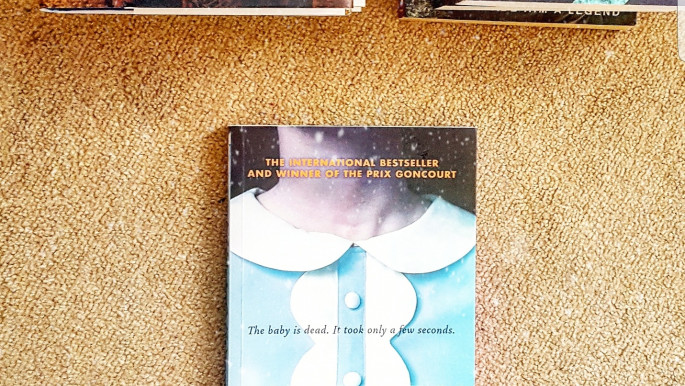The Occasional Virgin: Two Arab women who refuse to play by society's rules
"She didn't want to be male or female. She wanted to be a car so she could travel through the streets in broad daylight or the depths of the night with only freedom as her companion."
The Occasional Virgin is Hanan al-Shaykh's latest novel which was translated into English by Catherine Cobham. It is the story of two modern Arab women and their misadventures with men in the West.
The novel follows Huda and Yvonne, two women in their thirties who left Lebanon to pursue a more wilful and independent existence in the West.
Huda is a dark-skinned Muslim who lives in Canada and works in the theatre industry; Yvonne is a green eyed blonde Christian Lebanese who lives in London and works in the advertising industry. The pair have successful careers which they're dedicated to and enjoy, yet internally they are quite unhappy and feel unsettled because they're in their thirties and unmarried.
The Occasional Virgin explores the women's personal lives as they try to reconcile their past to their present, while hoping to secure a future with a man.
Al-Shaykh's novel is divided into two parts titled Two Women by the Sea and The Occasional Virgin. These sections are distinct, particularly in their settings; the former is situated somewhere along the Italian Riviera where the friends are on a holiday to spend time together.
The pair enjoy their time under the sun, while also looking for erotic opportunities with the men and boys that cross their paths. The narrative switches between the two friends, detailing their individual relationships to the sea and linked through it the fraught relationships they have with their families, especially their mothers.
 |
|
Huda returns to memories of her religious parents who tried to control her and forbade her from swimming in the sea (an activity she gets involved in nonetheless), whereas Yvonne recalls a more open and unrestricted connection to the sea. Yvonne "was born in a house whose windows all looked out to sea" and to her "the sea was the world. The changing seasons came from the sea" and "Even people's expressions came from the sea: 'I love you a whole sea'".
While Huda develops anxiety in the water having never learned how to swim, preferring to lay on the beach and read, Yvonne finds comfort and relief in the waters, even "imagining the resentment she felt towards her mother vanishing into the sea".
As young girls who try to wrestle against the gendered constraints within their family homes, Huda and Yvonne share complicated relationships with their mothers. They leave Lebanon to get away from the conflict and control, and to explore themselves more freely in their new, unrestricted lives abroad.
The novel is set in the aftermath of having achieved their independence and established careers of their choosing. As adults, they are women who are trying to live up to modern ideals, successful in their careers, yet the desire for marriage and children is strong, especially in Yvonne.
The second part of the novel follows the pair in London, switching to an entirely urban setting. This shift is palpable in al-Shaykh's writing, which makes the first section stand out as an exploration of two women and their love affairs with the sea and the pain and anguish of the memories it causes to surface.
After I finished the novel, I found out that Two Women by the Sea is actually an earlier novella al-Shaykh wrote which was never published in English. This revelation intrigued me to wonder why al-Shaykh extended the stories of these two female characters. As it appears, the answer is in what the second section covers.
 |
They leave Lebanon to get away from the conflict and control, and to explore themselves more freely in their new, unrestricted lives abroad |  |
The author revealed in an interview that she came across the Speaker's Corner in Hyde Park where she had a confrontation with a preacher on his views regarding race and Islam.
In the novel, Huda and Yvonne are walking in Hyde Park when they come across a Speaker's Corner, where people announce their views on religion, society and politics. An Indian youth by the name of Mirza Ghulam Ahmed approaches the women to tell them he's Mahdi, the eleventh imam. This exchange is interrupted by Ta'abbata Sharran, a seemingly devout Muslim young man who come across as an arrogant tyrant (possibly based on the preacher al-Shaykh crossed paths with).
 |
|
| Read more from The New Arab's Book Club: A dark tale: Leïla Slimani's Lullaby taps into every parent's worst nightmare |
After an argument over the origin of women covering their face with a veil (which Huda narrates is linked to a 9th century girl's rebellion against marriage to a stranger), Huda "dissects" his character and concludes that "he's a hypocrite, adopting a pious persona, and she feels she must expose him."
The rest of the novel involves the two women's comical wiles and schemes to make Sharran pay for his arrogance and to expose his hypocrisy. Huda's misadventures in trapping Sharran involve a Chinese virginity strawberry, an inventive and hilarious tool she comes across in an advert created by Yvonne. The details that come up in the narrative are hilarious and absurd, but they also reveal the women's frustrations with the opposite sex.
Al-Shaykh writes about the two women's sexual histories and affairs in great detail, which perhaps lends her work its controversial feature in the Middle East. However, to a Western audience, the novel will seem quite extraordinary in its telling of the lives of two Arab women who refuse to play by the rules society set for them. Yet they also find themselves yearning for the same kind of success that women aspire for "back home" in Lebanon, namely marriage and a happy partnership with a man.
At the hotel terrace in Italy, while waiting for their dates, the two laugh over their childish antics around men and blame their home country for their behaviour: "It's all Lebanon's fault. We left when we were teenagers and never grew up."
 |
Al-Shaykh writes about the two women's sexual histories and affairs in great detail, which perhaps lends her work its controversial feature in the Middle East |  |
Lebanon to the women is like a past they're attached to that they can't, and perhaps don't want to, shake off. At a wedding towards the end of the novel, Yvonne imagines her ties to her home: "…She used to think she was too tied to the place with thick ropes like ships' ropes, but with each visit to Lebanon she found the ropes that bound her had begun to fray, to disintegrate, to dissolve as if they were made of salt."
The complicated relationship of the women to Lebanon is seeped into their memories, it is a country that was once their home; where their families still live, where their troubled memories originate, and where their lives might have been different if they had stayed despite the war.
Instead of building their lives on their own, their families would have shaped their destinies and made them settle into a marriage, as Yvonne remarks to herself, "If I'd stayed in Lebanon, I wouldn't be on my own now, I'd have got married and my family would have stuffed me with food like the white goose so that my bridegroom the ghoul could devour me."
Meanwhile Huda confesses her own conflict to Yvonne and says, "Sometimes I wish I'd never left Lebanon. Maybe it's better to be content with staying in one place, since if you leave you can't escape this feeling of schizophrenia, however balanced a person you are."
 |
Lebanon to the women is like a past they're attached to that they can't, and perhaps don't want to, shake off |  |
The Occasional Virgin is the story of women suffering internally because of memories and men. Their success at work often feels to them like it's responsible for the failure in their personal lives.
Al-Shaykh's novel explores a refreshingly well-bonded female friendship that's mostly devoid of resentment for each other and is rather strengthened by the women's past and their lack of success where men and romantic relationships are concerned.
It's like an Arab version of Sex and the City, with fewer characters and more bizarre couplings. It could have been a compelling read; however, it feels like a great story that may have suffered at the hands of translation. Something in the narrative of The Occasional Virgin feels disjointed and disarticulated; there are some sections in the novel that feel profound and revelatory, yet with the turn of a page or two the narrative begins to pale and taste bland.
The novel doesn't offer an experience that smoothly cascades towards its bizarre conclusion, rather the writing and plot twist and turn and fail offer the cohesiveness one might expect in a richly told story.
Order your copy of The Occasional Virgin here.
Sumaiyya Naseem is a Bookstagrammer and freelance writer and editor who specialises in Middle Eastern and Muslim stories. In 2019 she joined the Reading Women Podcast as a guest contributor to talk about South Asian and Middle Eastern narratives.
Follow her on Instagram: @sumaiyya.books




